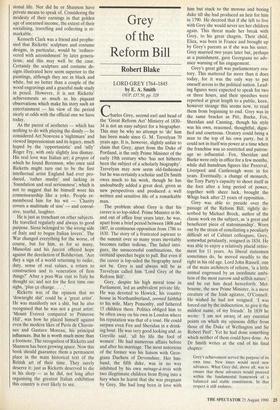Grey of the
Reform Bill
Robert Blake
LORD GREY 1764-1845 by E. A. Smith OUP, f37.50, pp. 328
the 'Great Reform Act' Ministry of 1830- 34 is not an easy subject for a biographer.
This may be why no attempt to `do' him has been made since G. M. Trevelyan 70 years ago. It is, however, slightly unfair to claim that Grey, apart from the Duke of Portland, is the only Prime Minister of the early 19th century who 'has not hitherto been the subject of a scholarly biography'. Trevelyan may now seem old-fashioned but he was certainly a scholar and Dr Smith owes much to his work, though he has undoubtedly added a great deal, given us new perspectives and produced a well written and sensitive life of a remarkable man.
The problem about Grey is that his career is so lop-sided. Prime Minister at 66, and out of office four years later, he was, apart from a brief period between 1806 and 1807, in continuous opposition from 1786 to 1830. The story of a frustrated aspirant to the summit over so many years inevitably becomes rather tedious. The failed intri- gues, the unsuccessful combinations, the orotund speeches begin to pall. But even if the career is lop-sided the biography need not be. Grey is and always will be as Trevelyan called him 'Lord Grey of the Reform Bill'.
Grey, despite his high moral tone in Parliament, led an ambivalent private life. He was devoted to Howick, his country house in Northumberland, seemed faithful to his wife, Mary Ponsonby, and fathered 15 children there. Politics obliged him to be often away on his own in London where his reputation was that of a roué. He could surpass even Fox and Sheridan in a drink- ing bout. He was very good looking and, as Greville said, 'all his life the fool of women'. He had numerous affairs before and after his marriage. The most notorious of the former was his liaison with Geor- giana Duchess of Devonshire. Her hus- band, the fifth duke, was in no way inhibited by his own menage-a-trois with two illegitimate children from flying into a fury when he learnt that she was pregnant by Grey. She had long been in love with
him but stuck to the morose and boring duke till she had produced an heir for him in 1790. He decreed that if she left to live with Grey she would never see her children again. This threat made her break with Grey, to his great chagrin. Their child, Eliza, was born in France and brought up by Grey's parents as if she was his sister. Grey married two years later but, perhaps as a punishment, gave Georgiana no adv- ance warning of his engagement.
Grey's great gift was parliamentary ora- tory. This mattered far more than it does today, for it was the only way to put oneself across to the political nation. Lead- ing figures were expected to speak for two or three hours, and their speeches were reported at great length to a public, keen, however strange this seems now, to read them from beginning to end. Grey was in the same bracket as Pitt, Burke, Fox, Sheridan and Canning, though his style was his own, reasoned, thoughtful, digni- fied and courteous. Oratory could bring a man to the top of his own party, but it could not in itself win power at a time when the franchise was so restricted and patron- age so influential. Fox, Sheridan and Burke were only in office for a few months, while dull humdrum figures like Perceval, Liverpool and Castlereagh were in for years. Eventually, a change of monarch, the Tory Party's capacity to shoot itself in the foot after a long period of power, together with sheer luck, brought the Whigs back after 23 years of opposition.
Grey was able to preside over the passage of the Reform Bill, rightly de- scribed by Michael Brock, author of the classic work on the subject, as 'a great and beneficent piece of statesmanship'. Worn out by the strain of conciliating a peculiarly difficult set of Cabinet colleagues, Grey, somewhat petulantly, resigned in 1834. He was able to enjoy a relatively placid retire- ment for 11 years. As liberal statesmen sometimes do, he moved steadily to the right in his old age. Lord John Russell, one of the main architects of reform, 'is a little animal engrossed by an inordinate ambi- tion of the most narrow and selfish nature'; and he cut him dead henceforth. Mel- bourne, the new Prime Minister, is a mere creature of the Irish agitator, O'Connell. He wished he had not resigned. 'I was forced out by the indiscretion, to give it the mildest name, of my friends'. In 1839 he wrote: 'I am not aware, of any essential points on which my opinions differ from those of the Duke of Wellington and Sir Robert Peel'. Yet he had done something which neither of them could have done. As Dr Smith writes at the end of his final chapter:
Grey's achievement served the purpose of its own time. New times would need new advances. What Grey did, above all, was to ensure that those advances would proceed within the fundamental framework of a balanced and stable constitution. In that respect it still endures.










































 Previous page
Previous page